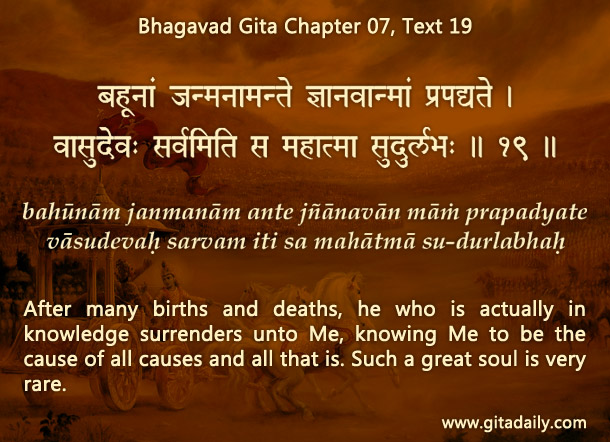Pantheism equates God with nature. It implies that whatever exists in nature is all that there is to God, that he has no self-existence beyond nature. Such pantheistic notions imply that nothing exists beyond temporary material nature, thereby rendering fantastical our longing for lasting life.
In contrasts, deism holds that God exists entirely beyond this world. He is the world’s first cause, having set it in motion. But thereafter, things function wholly according to mechanical laws. Such deistic notions make prayer pointless because God is held to have no power for responding to prayers by intervening within nature’s functioning.
The Gita’s theology avoids both these extremes of pantheism and deism. It underscores God’s immanence, even devoting its entire tenth chapter to explaining how his divine opulence manifests in this world’s attractive things. Appreciating God’s immanence makes us realize his eminent accessibility. Meditating on him doesn’t require withdrawing from the world – we can train ourselves to let the world’s attractive things spur our thoughts towards him.
Simultaneously, the Gita highlights God’s transcendence. It (09.05) indicates that God’s self-existence is not exhausted by being distributed throughout nature. He exists as the ultimate transcendental reality, the all-attractive Supreme Person Krishna. He is not an aloof first principle, but is a lovable and loving person.
This vision of God is best described as panentheism, which means that God exists both within nature and beyond it. The Bhagavad-gita (07.19) points to this holistic understanding when it declares that the wise know Krishna to be everything and surrender not to everything, but to Krishna. Why? Because they know that Krishna is not just everything, but is more than everything. He is the immanent sustainer of everything and the source of everything’s attractiveness – and the transcendent embodiment and fulfillment of our longing for everlasting love.
To know more about this verse, please click on the image
Explanation of article:
Podcast:


Hare Krsna Prabhu. PAMHO. Your fresh intellectual presentation of the Absolute Truth is keeping me sane from day to day. Thank you. May Sri Krsna bless you bountifully and endlessly with His mercy.
Grateful to be of service. Thank you very much for your kind words and your good wishes.
ys
ccdas
Prabhuji, You have wonderfully bought to light the clear meanings of the terms Pantheism, Deism and the Gita’s Philosophy of Panentheism. Simply wonderful and blissful. Thank you very much
Dear Rambhadra Priya P,
Thank you for your kind words.
ys
ccdas